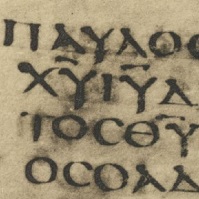
Exegetical Tools has created a new resource for those of you wanting to retain and improve your Greek. We posted a blog last week about their Basic Greek for the Week e-mail they are launching in conjunction with a huge Greek resource giveaway. They have now come up with a new and unique resource for intermediate Greek students–those who have just finished basic Greek, or those who took Greek before but would still classify themselves as “intermediate” rather than “advanced.”
This new resource is their Colossians Greek Reading Videos. These videos (26 total) translate through Colossians a few verses at a time, focusing on morphology, syntax, and vocabulary, which are the basic Greek elements that people soon start forgetting once they finish Greek courses. The author (or “teacher”) of the videos is Todd Scacewater, our very own Assistant Editor here at Books At a Glance. He is a Teaching Fellow in New Testament at Westminster Theological Seminary, where he teaches Greek and is finishing up his dissertation under Greg Beale.
The videos use a screencast approach with the Greek text on a whitescreen, and Todd writes and highlights on the screen as he goes along to help you keep up. He uses separate parsing sheets for words you likely don’t know, and explains those difficult elements of morphology such as vowel lenghtenings, stem changes, and more.
It seems this is the only resource of its kind now available, since it walks through an entire book of the New Testament and covers a few verses (3-5) at a time, which allows you to focus more on paragraphs and flow of thought, rather than simple clauses or single verses. Todd’s intensive focus on teaching you morphological changes in words and reminding you of syntactical categories also makes these videos effectively pedagogical. As one example, instead of simply telling you “this is an aorist verb,” which any Bible software could tell you, he tells you how you can know it’s an aorist verb. As a result, you will not only improve your Greek, but you will gain a better understanding of the flow of Colossians as a whole.
Todd stays focused on the language rather than expounding the theology of the letter, which keeps the videos at a good length, around 15-20 minutes each. Combined with a commentary or two, these videos would make an excellent resource for preparing to preach or teach through Colossians. But I recommend them to anyone who wants to work on their Greek and read the New Testament and would benefit from a seminary Greek professor walking them through the text. Check them out here.
Fred Zaspel
